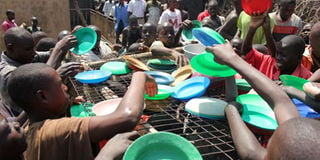Juvenile justice: Facilities still lacking

Juveniles at Kampiringisa Remand Home scrummble for plates as they prepare to go for food. PHOTO BY ABUBAKER LUBOWA.
What you need to know:
An expert in juvenile justice, Ms Sylvia Mukasa, the director of progammes at Centre for Justice Programmes and Innovations talks about the way forward on how to better the administration of children justice in the country.
What is juvenile justice and what categories of people benefit from this arrangement?
Juvenile justice is the area of criminal law applicable to persons not old enough to be held wholesomely responsible for criminal acts. Talking about juvenile justice means that category of children in conflict with law, alleged to have committed capital offences such as defilement, robbery, murder and minor offence such as theft, assault, child to child sex. Juvenile justice therefore refers to the process of investigation, apprehension, prosecution or diversion, and making the appropriate orders in respect of the young offenders for purposes of reforming them and deterring them from commission of such similar cases in the future.
Currently, the Justice Law and Order sector has a programme running in 18 pilot districts of Acholi sub-region, (Gulu, Amuru, Kitgum, Pader, Agago and Nwoya), north and eastern Uganda (Napak, Kotido, Moroto, Soroti, Kumi, Mbale and Bududa and central Uganda (Nakawa, Entebbe). It is a pilot in which innovative ways are being designed by system actors to address gaps in the services of children and to adopt a much friendlier and expeditious handling of child related cases of children in conflict with the law, at risk and those in contact.
Where can children in conflict with the law find such free services?
Children in conflict with the law can find free services in the following places
• First from the State funded legal services. Article 28 (2) (e) of the Constitution on a fair hearing provides for mandatory legal representation of all offenders of capital nature
• Aside from the State there are dedicated child-rights agencies who have raised the standard of juvenile justice in Uganda. Such organisations include: Defence for Children International which pays private lawyers to represent children, Legal Aid project of Uganda Law Society providing free legal services for the poor and marginalized such as the children, Justice Centres Uganda, Uganda Christian lawyers fraternity, FIDA Uganda to mention but a few .
• In addition, the probation officers are expected to be present at police when children are arrested and support them during investigations, produce social inquiry reports to courts to help in making appropriate orders and after serving sentences to prepare and reintegrate the children back in the community
What are the major loopholes in the dispensing of children justice?
Several distressing facts deserve attention in administration of justice for children in Uganda. These include:
Limited implementation structures, for instance, very few judicial officers, probation and police, and inadequate children facilities such as children police cells, remand homes, reception centres, rehabilitation centre, among others.
Violation of the 24 hour rule: By law children are not supposed to be arrested unless inquiries are complete, but often police arrest children and put them under incarceration before finalising with investigations.
• Lack of detention facilities for children: In many police postss the facilities are lacking, children are often imprisoned with adults.
There are others like determining the age of a child, limited legal services for children, case backlog, lack of a model rehabilitation system, and lack of a witness support system.
What measures do you propose as a legal expert to better these anomalies?
The measures include but are not limited to issuance of institutional guidelines and enforcement of standards, as well as reviewing and strengthening the probation function.
How would you want the government to get involved in administration of children justice, any suggestions?
First of all, I would like to note that government is already involved in administration of children justice, especially through establishment of the legal and policy infrastructures in place. For example, we have the Children’s Act, the Penal Code act, the Trafficking in person Act, and the amendment to the law relating to defilement under the penal code.
Government has also put in place institutions to implement these laws such as Police, courts of law, probation, remand homes, prosecution, lawyers, and local government. Currently, the emphasis of the Justice Law and Order sector is on improved services delivery to children building on its Justice for children Programme.
Under this programme, JLOS is ensuring that all categories of children including those in conflict with law (juvenile justice and those in contact like the witnesses and victims) and those at risk (potential offenders, children neglected and abused ) are accorded better services. However to consolidate these efforts the government should get involved in administration of justice by expediting the amendment of the Children Act and putting in place an effective infrastructure and resources to have it implemented.
Children justice is handled in a friendlier manner than how adults are treated in court. Why is this so?
We treat them with care knowing that they are children and know less than adults. Children are in limited control of what happens around and within them, and are still being guided based on their evolving capacities. According to child justice standards children are supposed to be treated with empathy, in a nondiscriminatory manner, and with a listening ear from the administrator or service provider. They are vulnerable and still need protection to avoid any irreparable damages.
Interviwed by Anthony Wesaka




